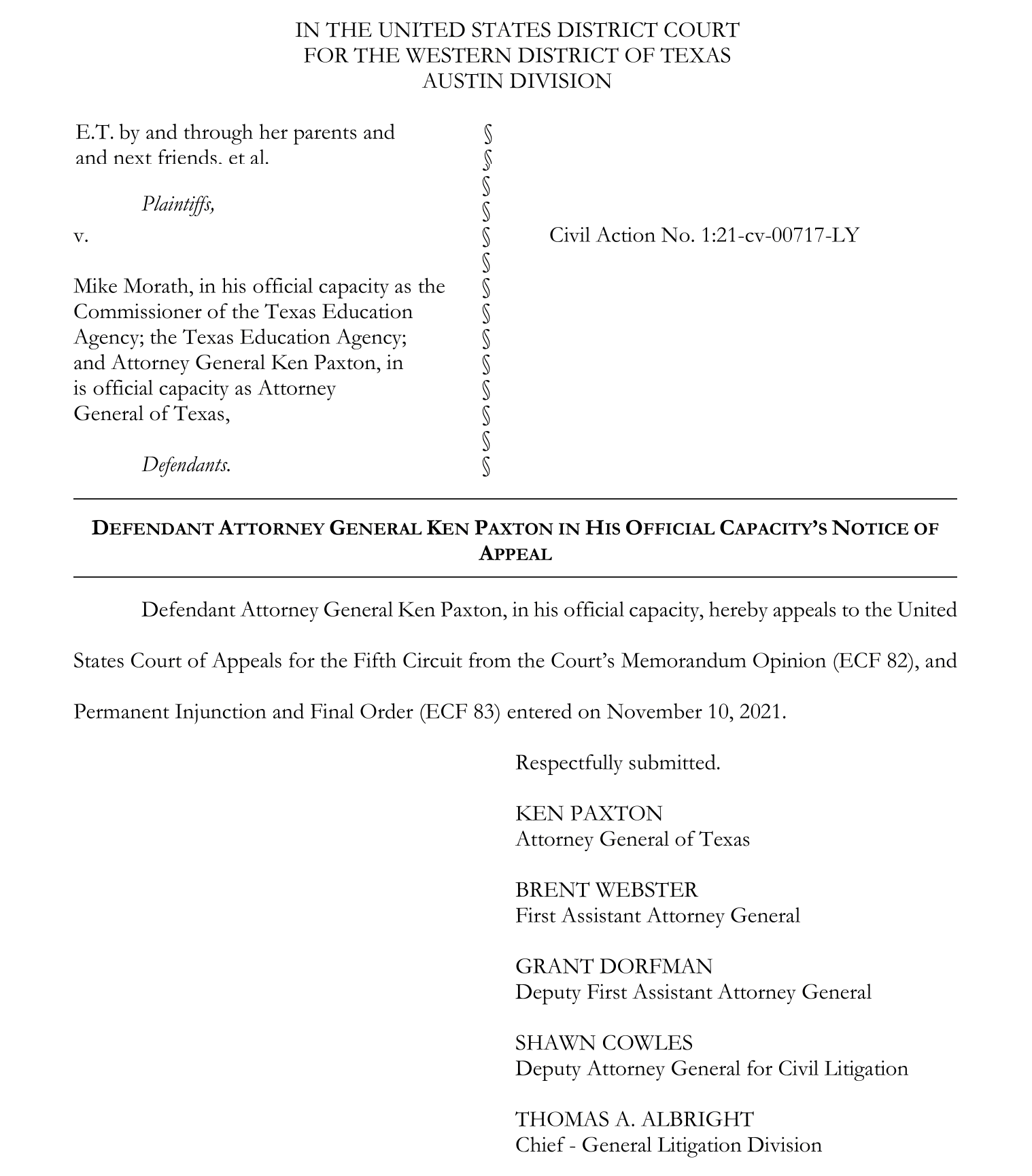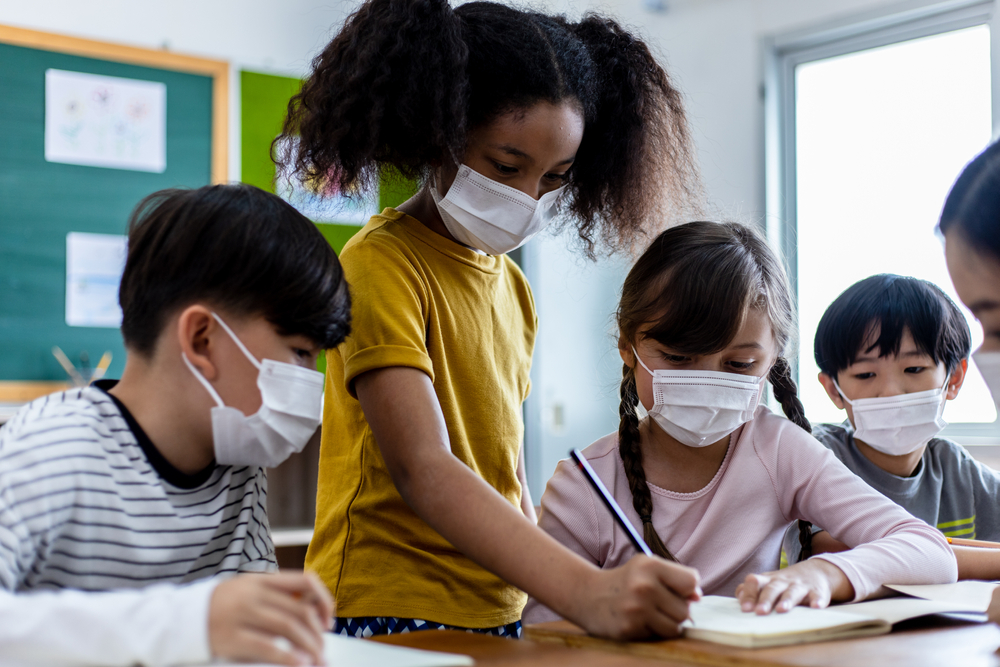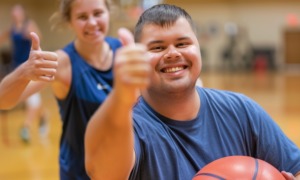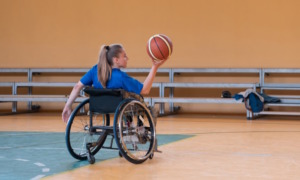Parents who don’t want their children to wear masks while in school during the COVID-19 pandemic have insisted that forcing them to do so violated their individual freedoms. But a federal judge sided with Texas parents of students with disabilities who argue that banning schools from requiring masks — as the state’s governor still aims to do — undercut their kids’ rights and risked the health of an already vulnerable population.
Even as Texas Attorney General Ken Paxton appeals that Nov. 10 federal ruling, disabilities advocates suggest that the ongoing legal battle could influence the national discussion about masks in schools and the rights of students with disabilities.

United States District Court
Texas’ attorney general is appealing in federal court for the state’s ban against school mask mandates to be reinstated. Click here to read complete two-page document.
Paxton had sued six school districts in September for defying Texas Gov. Greg Abbott’s executive order banning mask mandates.
Renae Eze, a spokeswoman for Abbott, declined to give live answers to Youth Today’s questions about the ruling. She emailed a statement: “As a paraplegic himself, Gov. Abbott cares deeply about the health and safety of disabled students, just as he does for all Texas students. Gov. Abbott continues to advocate for Texans with disabilities through the Texas Governor’s Committee on People with Disabilities.
“Nevertheless, he believes the federal district court’s decision to be flawed and is working with the Attorney General’s office to appeal that decision in order to protect Texans’ rights against school districts attempting to impose mask mandates.”
U.S. District Judge Lee Yeakel ruled that Abbott’s order blocking school districts from requiring masks violated the Americans With Disabilities Act because it impeded the plaintiffs’ ability to remain safe while getting an education.
If Texas loses appeal, Louisiana and Mississippi anti-mask mandates also will be outlawed
Robert Winterode, an attorney representing Disability Rights Texas in its lawsuit against Abbott’s administration, said the case could provide a template for similar cases nationwide. “We hope that this victory will empower the judges in other circuits and will give good precedents in those cases,” Winterode said.
Additionally, if Disability Rights Texas prevails in the appeal, the decision would also would be binding in Louisiana and Mississippi, which also are in the U.S. Court of Appeals for the Fifth Circuit. If the case is further appealed, that ruling could become a binding precedent for the entire country.
 “Eventually we might be headed to an even higher court, but I think some of that may also depend on the pandemic,” Winterode said. “If it continues to be as big of an issue as it was in July and August in the future, the Supreme Court may have to rule on this.”
“Eventually we might be headed to an even higher court, but I think some of that may also depend on the pandemic,” Winterode said. “If it continues to be as big of an issue as it was in July and August in the future, the Supreme Court may have to rule on this.”
Abbott’s original order caused havoc for their kids, some parents said.
“Because of the state’s ban on [mask] requirements, the school stopped enforcing the policy almost immediately and we had to keep our daughter home so she would be safe,” said Houstonian Karina Pichardo, whose daughter has Down syndrome. “Our daughter Miranda loves going to school, and we are relieved that we can work with the school directly to make sure accommodations are appropriate to allow her to attend.”
Florida, Oklahoma and Utah are the only states that currently have bans on mask mandates in schools in effect, according to Education Week. In addition to Texas, lawsuits have blocked attempted bans in five other states: Arizona, Arkansas, Iowa, South Carolina and Tennessee.
Winterode said the plaintiffs in the Texas case had a variety of illnesses, from immune deficiencies to Down syndrome to moderate-to-severe asthma, that elevated their risks of severe complications if they contracted COVID-19. While masks do not guarantee protection against the virus, a randomized study by researchers at Stanford and Yale Universities, enrolling 350,000 people, found that when most people in a given community mask up, it reduces transmission of the virus.
Given that, Winterode said it was hard for him to understand those who argue that masks in schools should be a purely personal choice.
“They never seem to really look at the other side of the coin … [T]hat choice to send their kid to school without a mask will endanger some kids who are at high risk for COVID and potentially result in life-threatening consequences for them,” Winterode said. “It’s always interesting to me that in this state, and throughout our country, really, there seems to be a lack of acknowledgement about how our choices can affect others.”
Winterode said that masks unfortunately have been politicized during the pandemic, but he hopes that the Texas lawsuit can steer the conversation in the opposite direction.
“This is the highlight of my legal career being on this case,” Winterode said. “Because I suspect that allowing the school districts that chose to do so to continue requiring masks likely resulted in some lives being saved.”






























